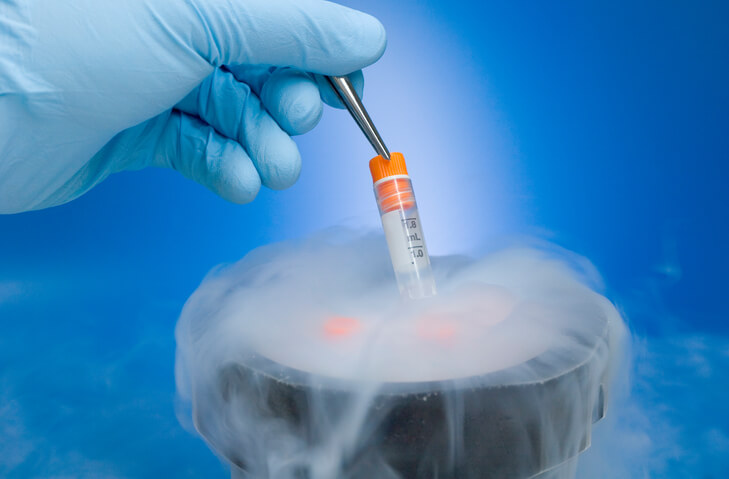One of the biggest questions that intended parents have when they’re preparing for a surrogate journey is what kind of embryo transfers to use. There is a lot of information out there touting the benefits of fresh vs. frozen transfers and, when you know you can only afford a few transfers, it can be stressful to determine whether to put all your eggs in one basket, so to say.
If you’re deciding whether to use a fresh or frozen transfer in surrogacy, there’s one important thing to know: Because everyone’s surrogacy situation is different, you won’t be able to determine the best path for you based on information you find online. Only your doctor can describe the benefits of each medical path in your particular case and help you choose the procedure that’s right.
However, as you start your research, there are a few important things you should know.
What New Studies Reveal
Conventional medical advice stated that fresh embryos were preferred over frozen embryos. In the earlier decades of in vitro fertilization, doctors hypothesized that implanting a fresh embryo was more “natural” than the thawing of a frozen embryo, suggesting that a fresh embryo would be more likely to result in a successful pregnancy because of its higher quality.
However, new studies have revealed this isn’t always the case. Scientists have discovered there is relatively no difference between the success of frozen embryo transfers and fresh cycles resulting in a live birth. In a 2016 study, more than 1,000 women underwent a fresh embryo transfer, and almost 300 underwent a frozen embryo transfer. Researchers studied the results and found that the live births resulting from fresh cycles occurred in 70.4 percent of the women, while frozen cycles were successful in 65.6 percent of women who underwent this procedure.
Today, there’s no real evidence that one process over the other will determine the success of the transfer. Instead, there a few other important details that come into play.
What Really Determines the Success of an Embryo Transfer
Whether an intended parent uses a frozen or fresh embryo transfer, there is really one detail that predicts the likelihood of a pregnancy: the health and age of the eggs at time of harvest.
Before an embryo is transferred into the uterus of a surrogate, it is evaluated by medical professionals through pre-implantation genetic screening. This screening determines whether an egg is healthy enough for transfer. Usually, when medical professionals evaluate several embryos, they select the highest quality ones for transfer.
One of the biggest factors in an embryo’s quality is the egg and sperm cells involved. Whether an embryo is fresh or frozen doesn’t substantially play a role in the quality of the embryo, in contrast to what many believe. An egg cell can be just as healthy when thawed as it is when harvested fresh. What really matters is the age of the egg cell when it is harvested — not when it is thawed.
For example, women who harvest their eggs earlier in their life (like at the peak of their fertility in their 20s) and freeze them will typically have healthier embryos than a woman who creates a fresh embryo from her eggs in her early 40s. This is because, in the frozen egg or embryo, the eggs do not age; instead, they retain their quality until they are thawed. A fresh cycle with an older woman has a lower chance for harvest of high quality eggs — and, therefore, a higher quality embryo.
Determining Which Path is Best for You
Most intended mothers who start the in vitro fertilization process before pursuing surrogacy will have frozen embryos remaining. As long as those embryos remain high quality, there is typically no reason for her to create a fresh embryo for transfer to her surrogate’s uterus.
However, it’s worth noting that, if a woman creates frozen embryos later in life (with lower quality eggs), it may be a smarter move to create a fresh cycle with a donor egg. Women who retrieve eggs later in life typically have smaller chances of a live birth, and using a healthier egg from a younger donor can greatly increase the chances of success in surrogacy.
Similarly, intended parents who have not yet created an embryo before pursuing surrogacy (for example, single intended parents) will have typically have no other option than using a fresh embryo transfer, unless they wish to use a donor embryo.
Ultimately, if you are deciding between a fresh and frozen embryo transfer for your surrogacy, it’s important that you speak with your doctor first. They can evaluate your personal circumstances and recommend to you the path that offers the best chances at success.
Remember, the choice of “fresh” vs. “frozen” likely won’t be the determining factor in the success of your surrogacy. All of the other factors involved — the quality of your embryo, the health of the surrogate, etc. — play important roles in bringing a child into the world for you.
If you have further questions about the medical process of surrogacy, or would like to receive a referral to a trusted local fertility clinic, you can always contact our surrogacy specialists at 1-800-875-BABY(2229).
